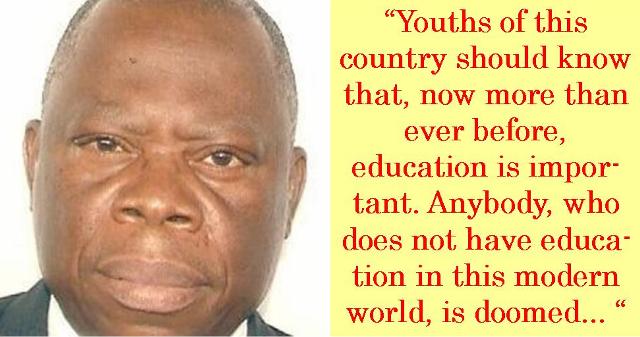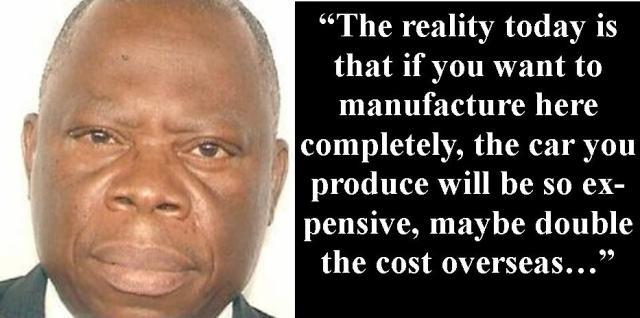[dropcap]A[/dropcap]fter completing a course at Yaba Technical College and training as an Engineer in Japan, Mr. Robert Ndubueze Ugbaja was recruited by Suzuki Motor Corporation to work with its Nigerian partner, Boulos Enterprises limited as a young engineer. That was 45 years ago. He was at a time in charge of the company’s production and manufacturing and later retired as an Executive Director, but had to return after being appointed as the company’s chairman.
In this exclusive chat with Editorial team of Motoring World International (MOWI), Mr. Ugbaje lists challenges that forced many Nigerian companies, including Boulos Enterprises, to suspend manufacturing, what the future holds uneducated auto mechanics, technicians as well as dealers and lots more..
Excerpts:
MOWI: With the auto policy, Nigeria is on another journey to auto manufacturing. What is the current status of Boulos plant and what percentage your motorcycle parts are sourced locally?
Ugbaja: Basically, what we are doing today is assembling. Up till 1990, this plant was established as a fully integrated manufacturing plant, where we produced our electrical harnesses, some of the electrical parts like the trafficators; we did welding, pressing and assembling. But today those manufacturing aspects have gone down, because they are not competitive again, due to high cost of energy and of bringing the raw materials. We used to produce parts here for Peugeot Automobile, and they have the same issue. So everybody has gone back. Hopefully, if changes occur again, the facilities are there. The engineers have been trained. Then we will go back to manufacturing, when it is feasible.
 You can see the National Automotive Policy. Now it is based mainly on first stage of assembling of SKD and then you progress to CKD. The reality today is that if you want to manufacture here completely, the car you produce will be so expensive, maybe double the cost overseas. But at this stage of our development, we have to make do with assembling and progressively develop more local content as the infrastructure improves here.
You can see the National Automotive Policy. Now it is based mainly on first stage of assembling of SKD and then you progress to CKD. The reality today is that if you want to manufacture here completely, the car you produce will be so expensive, maybe double the cost overseas. But at this stage of our development, we have to make do with assembling and progressively develop more local content as the infrastructure improves here.
MOWI: What minimum infrastructure do you require to get back to that level, where your plant and the likes of Peugeot used to be?
Ugbaja: Number one is power. We have about six power plants here. We have gas powered turbine, diesel-powered plant, just to generate our own electricity. Today’s cost of diesel and maintenance is high. These are things you take for granted in other places in the world. You just build your factory and connect to the public grid. But here we have more than six bore holes. We generate our own water, we generate our own power. And again, in this automotive industry, mostly, the raw materials you need are special engineering steel for some of the parts like the crank shaft. Even the body parts need cold roll steel sheets. We don’t have the steel mills here producing flat sheets.
MOWI: What about Oshogbo Steel Rolling Mill?
Ugbaja: What they produce are construction steel, rods, angle iron and so on, not flat sheets. There is no flat sheet mill in Nigeria yet.
MOWI: But an auto assembler told us they source flat sheet from Oshogbo Rolling Mill with which they build body of the buses they assemble.
Ugbaja: No-No-No. We don’t have a fully integrated flat sheet manufacturer or company that manufactures flat sheets from the raw materials, from the iron ore, we don’t have it. Some have what they call billets, which you can roll and cut and so on. It is something that we had hoped would have been accomplished before 1990. But you know what happened with our steel projects at Aladja, Katsina, Oshogbo and Ajaokuta. They are all moribund. But once these infrastructures are put in place, then we will become competitive. Today, if I want to produce the fuel tank, if I import the flat sheet, I will pay the duty and VAT on it. And I will pay all the clearing charges. Is my competitor doing the same thing in China, Indonesia or Malaysia? No. All he will do is pick up his phone and call his supplier, who will deliver to his doorsteps on credit. And he will produce and pay him after one month or two months. This is it. And for me to even place an order, the transit time from the time from the day of order till it gets to me is more than four months. And meanwhile I have established the LC borrowing money from the banks and paying at an interest rate of minimum of 18%.
MOWI: Right now, do you assemble from SKD or CKD?
Ugbaja: While most of auto companies today are doing SKD, here we are doing full CKD. We have the capacity. We were doing manufacturing. We got to up to 23% of local content in the past. Ourselves, Peugeot and many other companies, we reached over 20% local content and then went down.
MOWI: Automotive technology is getting more sophisticated, and your engineers have been making efforts to train dealers and mechanics. But obviously, not all dealers are educated, and so not all might understand the new technological trend in the auto industry. What is Boulos doing to carry the uneducated ones along?
Ugbaja: Those who cannot adapt or who are not trainable would definitely drop out. The role of the company is to build capacity, not only within the company, but also with their customers. They have to continuously train the customers, which is what they are doing now. They go round the country to train mechanics. Any time there is modifications or there is new technology, our engineers go back and train them. But the real issue is, even when they go to train them, if a trainee’s capacity to learn is small or he or she is not educated, there is not much you can do. And definitely, in future, it’s going to happen. It was like that sometimes in the past. You’d find that some of the people, who would be repairing some of these motorcycles and vans, would be the people who would have gone to technical colleges, train centres or vocational schools to learn. These are the people for the future, when you are going to have electronics on motorcycles like on cars today.
I will tell you, more than 60% of the mechanics we used to have before are no longer relevant.
MOWI: From what you are saying, there may be no place for the uneducated auto mechanics and technicians in near future, am I right?
Ugbaja: They will not die. But they will need to do something about their education. Or they will probably have to go into another kind of business, such as trading, farming or anything. But the people who will be able to repair and maintain the modern cars and motorcycles must have the knowledge.
MOWI: Even farming, these days are being mechanised. So what advice would you offer the youths of today?
Ugbaja: Youths of this country should know that, now more than ever before, education is important. Anybody, who does not have education in this modern world, is doomed. I don’t see how anybody can survive, whether you want to be a trader or farmer or anything, without education, you can’t survive. It’s a reality. There is nothing you do today that you don’t require education. If you go to the market today, among shop keepers, you find school certificate holders and even graduates. And today, every one is preaching entrepreneurship. Youths need to go to school, learn and start up something. You can open a mechanic shop or retail outlet for provision or whatever, but you need education. Today, it’s becoming mandatory that all manufacturers of food would be able to put nutritional values of the food on the package. So if you have a trader, who cannot understand, who cannot read and you tell him you want to buy so-so and so food, for instance, the one without much salt and so on, if he cannot read, he can’t do it.
MOWI: Judging from your experience, how do you see the future of commercial motorcycling, popularly called Okada in Nigeria?
Ugbaja: In the next 10 years, you’d find out that these Okada usage would drop drastically, as soon as the transportation infrastructure of the country improves. And today also, you find more educated people would like to have their own personalised means of transportation. And many would opt for motorcycle, which was how it used to be. That is why at Boulos, we can’t be complacent and just let things remain the way they are.
MOWI: What do you do at leisure?
Ugbaja: I’m the Chairman of this company. I also have business interests. I also own several other businesses, some I am on their board and some I own outrightly. And I do a bit of consulting. So I’m busy.
MOWI: You don’t even have time for golfing or other things?
Ugbaja: Oh No! No. I don’t have time. But I am very active and I do a lot of exercises. I do walk out and so on, and I play hard as well.
[tabs type=”horizontal”][tabs_head][tab_title][/tab_title][/tabs_head][tab]”…today those manufacturing aspects have gone down, because they are not competitive again, due to high cost of energy and of bringing the raw materials. We used to produce parts here for Peugeot Automobile, and they have the same issue. So everybody has gone back. Hopefully, if changes occur again, the facilities are there. The engineers have been trained. Then we will go back to manufacturing, when it is feasible…” – ROBERT UGBAJA[/tab][/tabs]





